Radio listener needs during prime time hours indicate that not every often-used radio format element works for your morning show and afternoon drive program.
In the spring of 2012, German research institute IFAK interviewed about 3,000 people (14-59 years) who live the state of Bavaria and have an Internet access. The Bavarian media association BLM ordered this so-called ‘Positioning Study’ to find out what radio listeners want to hear during prime time. Let’s have a look at the highlights.
Get radio audience insights
Although the online survey took people under 20 minutes to complete, there were several quality control questions built in to see whether respondents were still paying attention or not. The answers of those who didn’t were ignored. What follows is an overview of radio audience insights from Bavaria, Germany, that might give you inspiration for best practices you can use in your own market. This research is most relevant for music- and service-based formats with a target demographic between 14 and 59 years. (If you don’t have time to study it all, you can scroll all the way down for the the key findings in a nutshell.)
4% don’t listen to the radio
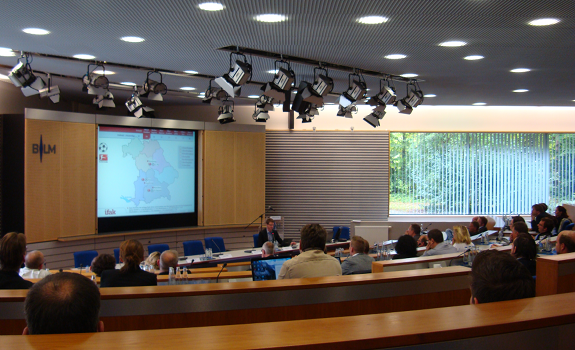
IFAK institute researcher Jörg Sunnus presents the results of their Positioning Study 2012 for local radio stations in Bavaria in the auditorium of the local media association BLM in Munich, Germany (photo: Thomas Giger)
4/100 Bavarians ignore radio
Let’s start with the ‘bad news’, so we have that behind us. During the survey, 3,035 interviews were accepted. 129 of them – 4% of all interviewed people – don’t listen to the radio, at least not from Monday through Friday. They were being asked to say whether they agree with these explanations for not listening based on pre-given statements:
- I’m not interested to listen to the radio (78%)
- I don’t have the time to listen to the radio (59%)
- I can’t (or I’m not allowed to) listen to the radio at school or at work (51%)
- I can’t receive a radio program that I find interesting enough to listen to (38%)
- I don’t have a radio (33%)
- I can’t agree with my family or colleagues about which station to listen to (11%)
‘I prefer to listen to my own music collection’

People who don’t listen to the radio often prefer to hear songs from their personal music selection (photo: unknown)
Most non-listeners ‘not interested’
Apart from that, the 129 ‘non-listeners’ had to describe why they don’t listen to the radio (during weekdays) by themselves. The most commonly given reasons for not listening in people’s own words were:
- I’m not interested to listen to the radio
(very frequently mentioned)
- I prefer to listen to my own music collection
- Too much commercials and talk; commercials are irritating
(frequently mentioned)
- I don’t like the music that’s being played on free-to-air radio stations
- I have no (or a bad quality of) radio reception in my home
- I prefer quietness; I love silence
- There’s better stuff than radio
- I don’t feel like it
(less frequently mentioned)
Comedy unimportant, interaction & contests obsolete
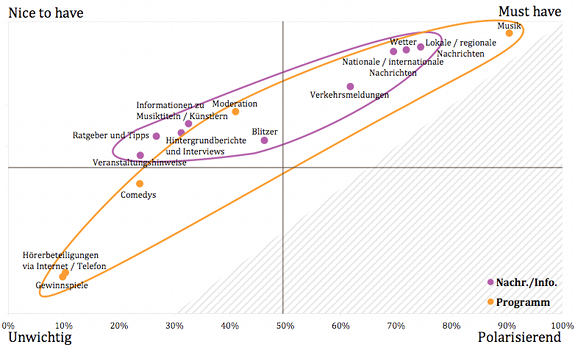
Two opposite sides of the content spectrum – while 9 out of 10 radio listeners desires music during prime time hours, just 1 out of 10 finds interaction and contests important, as shown within the orange circle above (graph: IFAK)
Think about cutting contests
The fact that 4% of people ignores radio during weekdays, is actually good news. It means that 96% – 2,906 of the 3,035 people interviewed – still enjoys radio during weekdays! However, listeners classify not only comedy elements and radio contests & promotions, but also audience interaction to be unimportant during prime time. While I can imagine that listeners are “sick of everything fake” (as Elvis Duran says) and tired of commercial-alike promos (as Dennis Clark explains), the listener’s opinion about interaction surprises me. Because what do many successful morning shows feature a lot? Interaction! Elvis Duran underlines: “It’s paramount to have callers on”. So how do we explain this?
 Improve on-air interaction quality
Improve on-air interaction quality
Have social media (photo) taken over the position of people’s favorite backchannel? Or do audiences prefer ‘internal’ interaction; when the presenter talks directly to them, to ‘external’ interaction; when he talks to others? Could it be that on-air conversations interfere with the listeners’ internal dialogue or challenge his attention span during the morning rush? Or should we simply make phone-ins and contests more interesting for the audience?
Stick to programming essentials
Here’s the complete list of what radio listeners find important and not important to hear during prime time hours, such as the morning show or afternoon drive. From very important to not important for the majority of the audience, these are:
- Music (90%)
- Local and regional news (74%)
- Weather forecast (72%)
- National and international news (70%)
- Traffic reports (62%)
- Traffic control warnings to avoid speeding tickets (46%)
- Presentation (41%)
- Information about songs and artists (33%)
- News backgrounds and interviews (31%)
- Tips & advice on how to do things (27%)
- Information about (local) events (24%)
- Comedy (24%)
- Listener interaction through Internet and phone (10%)
- Contests (10%)
Many listeners cannot be bothered with
classic morning show ingredients

Just 12% of all listeners says to be interested in news about celebrities like Rihanna & Chris Brown (photo: Reuters)
Feature content that matters
The researchers were also asking people about which topics they absolutely want to hear about, and which topics don’t interest them at all. It seems that many listeners cannot be bothered with classic morning show ingredients like showbiz sleaze and daily horoscopes. Of course, the sample covers all kinds of age groups (up to 59 years) and a relatively equal amount of women and men – meaning that the average 25-year-old female might enjoy the latest gossip about Rihanna and Chris Brown. Still, I think it’s useful to see the complete list of topic preferences of radio listeners according to this study:
- Disasters (58%)
- Local and regional politics (52%)
- National politics (49%)
- International politics (44%)
- Environment / energy (43%)
- Heavy crimes (41%)
- Accidents (40%)
- Local economy (32%)
- National and international sports (29%)
- General economy (31%)
- Local sports (30%)
- Event tips (30%)
- Society (29%)
- Health and medical care (27%)
- Education (24%)
- Movies (22%)
- Light crimes (21%)
- Concerts and artists (21%)
- New products and trends (16%)
- Celebrities (12%)
- Horoscopes (10%)
- Beauty and wellness (8%)
Sports and economy polarize radio audience genders

Baseball results and stock numbers are typical male audience content (photos: Boston.com, Nakit Jaroonsrirak)
Treat sports & economy carefully
It’s also relevant to know more what radio listeners want to hear in news bulletins on the station. An important note for radio stations that have an equal (or close to equal) amount of both genders: based on this German research, it seems that sports and economy polarize radio audience genders – most female listeners are not interested in sports and economy news. However, when this news has a local angle, it seems to be a bit less polarizing than when it falls into the national or international category (I guess because it’s more relatable) – but it’s still a turn-off. The researched topic rundown looks like this:
- National and international news (58%)
- Local crimes (43%)
- Local accidents (43%)
- Local politics (38%)
- Local economy (32%)
- Local sports (30%)
- Local events (29%)
- Local environment / energy (29%)
- Local education (28%)
- Local health (25%)
3 out of 4 radio listeners don’t find sound bites necessary
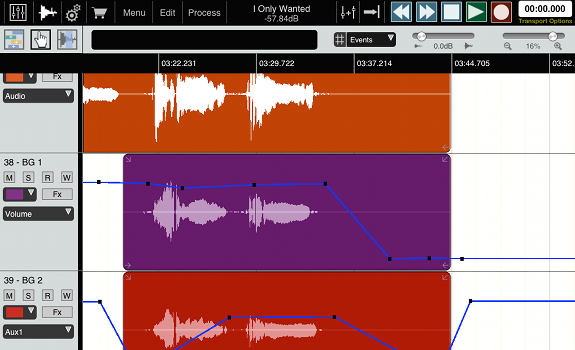
75% of radio listeners apparently don’t need to hear sound bites within a news story (photo: WaveMachine Labs)
Avoid too many voices
Good to know is in which form we should deliver the news. That people prefer headlines and short stories is common knowledge, but an interesting insight is that at least 3 out of 4 radio listeners don’t find sound bites necessary within a news story. Isn’t this remarkable? Because you would expect that it’s good to make the news sound more alive, by adding authentic sounds and vocal variety through sound bites. But especially those by politicians seem to be a ‘no go area’. Here’s how several storytelling genres within a radio newscast have been rated in terms of importance:
- Headlines (58%)
- Short stories (read by news anchor) (55%)
- Longer stories (read by news anchor) (46%)
- Quotes by correspondents (within a news story) (25%)
- Quotes by people involved (within a news story) (24%)
- Quotes by listeners (within a news story) (16%)
- Quotes by politicians (within a news story) (14%)
- Quotes by local politicians (within a news story) (12%)
‘Believable, friendly and to the point’
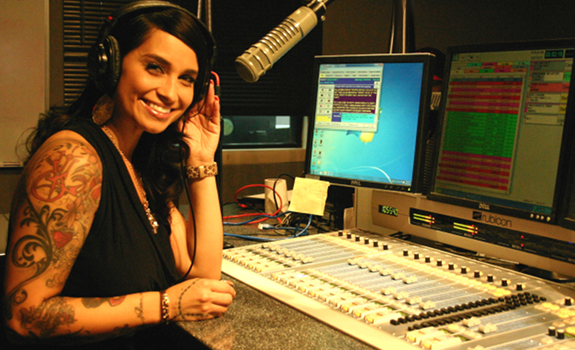
Radio personality Jackie Morales during her show on 101.5 jamz in Phoenix, Arizona, USA (photo: Nicki Escudero)
Avoid exaggerating topics deliberately
Believable, friendly and to the point are the 3 main characteristics that radio listeners value in presenters. Most bullet points on this list are not very far apart from each other in terms of percentages; many people apparently find them (almost) equally important. By the way, the last one – ‘illustrates topics by exaggerating’ – appeals to 11%, but is being considered as ‘absolutely obsolete’ by 55% of the audience. So it seems that most radio listeners don’t like a lot of theatre on the air.
- Believable (88%)
- Friendly (87%)
- To the point (86%)
- Competent (83%)
- Informative (82%)
- Takes listeners seriously (80%)
- Professional (79%)
- Entertaining (77%)
- Talks about relevant topics (75%)
- Authentic (73%)
- Involved (72%)
- Spontaneous and witty (70%)
- Serious (69%)
- Funny (66%)
- Knows what goes on in my state (65%)
- Knows what goes on in my country and in the world (56%)
- Has a personal opinion (56%)
- Knows what goes on in my city or town (53%)
- Courageous (39%)
- Has my way of life (37%)
- Cheeky (32%)
- Thinks like me (27%)
- Illustrates topics through exaggeration (11%)
Bring people in a good mood to start their day

Morning shows have to be feelgood and energetic, so listeners start their day in a good mood (photo: Roper Photo)
Start people’s day positive
The German study also tried to define what listeners expect when they tune into a radio station during prime time. To bring people in a good mood to start their day seems to be the key element of every morning show. Here’s the complete list:
- Presenters help me to start my day in a good mood (77%)
- Presenters are peppy and intoxicating (71%)
- News is reported objectively (70%)
- Much information in the news (68%)
- Lots of music to sing along to (65%)
- The program is funny (62%)
- Much information in the talk breaks (59%)
- The program is peaceful / relaxing (41%)
Music can also be the main tune-out reason
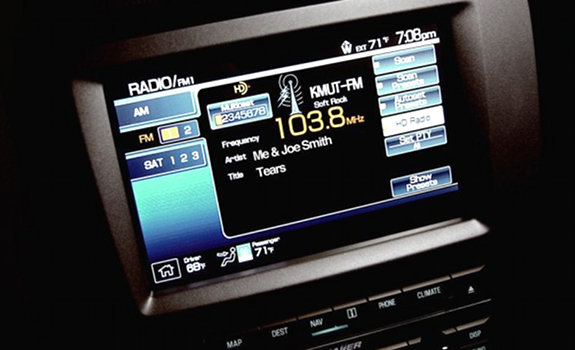
Music is the #1 tune-in reason for radio listeners – but you have to play the right music for them (photo: Leforse.com)
Optimize your music playlist
Apart from knowing what radio listeners like to hear – so we can include these tune-in factors into the program schedule – it might be good to keep in mind what turns radio audience off as well. It turns out that in general, music is not just the major tune-in factor; it can also be the main tune-out reason. This is what radio listeners in the German state of Bavaria marked as their most important reasons for switching to another radio station, in order of importance:
- Find better music 67%
- Advertising bothers me 57%
- Find more music 55%
- Reception of the station is becoming bad 47%
- Radio contest bothers me 35%
- (Selection of) topic(s) doesn’t appeal to me 30%
- Looking for traffic reports 26%
- Looking for more current news/information 25%
- Looking for more local news/information 23%
- Looking for better presenter 21%
- Looking for better news 21%
- Looking for speed control reports 19%
- Looking for more national news 13%
- News reports are not sufficiently researched 12%
- Looking for a radio contest 4%
Summary BLM Positioning Study 2012
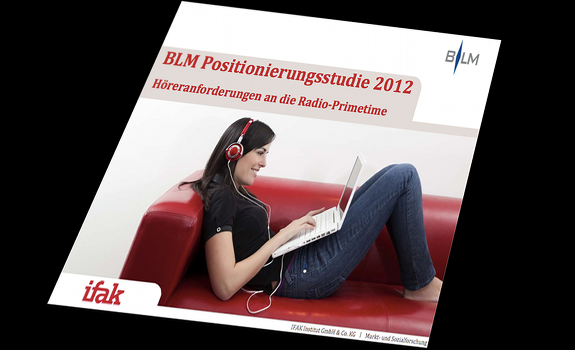
Avoiding polarizing content when your radio station has a mass-appeal radio format is one of the key findings in the BLM Positioning Study 2012, based on interviews with 3,000 inhabitants of Bavaria in Germany (slide: IFAK)
Remember prime-time listener preferences
Here’s a summary of radio listener insights for morning show & afternoon drive, based on a study in the German state of Bavaria among people between 14 and 59 years – especially relevant for music stations that offer news & service elements as well:
- About 96% of the population listens to the radio on weekdays – the 4% who don’t, say that they have no time, prefer their own music collection, or don’t like commercials and/or talk
- Radio listener needs during mornings and afternoons are based on music, a mix of local/regional and national/international news, as well as weather and traffic
- Disasters are events that must be reported: nearly all social-demographic groups classify catastrophes as indispensable parts of the news, followed by political issues
- Whether local/regional or national/international political topics are in greater demand depends on people’s education – the lower the education level, the greater the local focus
- Listeners love headlines and short stories, but they don’t seem to like interview quotes within news stories – especially not sound bites of politicians
- People consider comedy elements, radio contests & promotions, and audience interaction as being ‘unimportant’ during mornings and afternoons
- Showbiz news, horoscopes and beauty & wellness topics during prime time receive the highest rejection rates of all researched content forms
- Sports polarize a mixed gender radio audience more than any other subject area; detailed sports coverage will therefore most likely lead to a loss of female listeners
- Radio presenters should be mainly believable, friendly and to the point, and should especially not deliver stories in an exaggerated way as listeners don’t like that
- The morning show should make radio listeners start their day in a good mood; morning personalities should therefore sound positive and energetic
- People switch to another station when they don’t like (or don’t get enough) music, are disturbed by commercials, lose the reception, and don’t like content (disturbing competitions, uninteresting topics)
- During radio contests and sweepstakes, the risk that the audience will switch off is almost 9 times higher than the probability that they’ll tune in to hear it
Read also:
- “Market Research Is A Rear-View Mirror”
- Programming (related articles)
Stay tuned, follow us @RadioILOVEIT and click below to share this post:





Add Your Comment